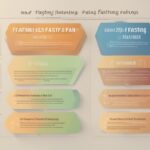Hey there, ladies! If you’ve ever wondered whether fasting could be the key to unlocking better energy, improved focus, or even a healthier relationship with food, you’re not alone. Fasting has taken the wellness world by storm, with everyone from fitness enthusiasts to medical professionals singing its praises. But here’s the thing—fasting isn’t a one-size-fits-all solution, especially when it comes to fasting women’s health. Women’s bodies are beautifully complex, with hormonal cycles and unique metabolic needs that can make fasting a bit trickier to navigate. In this post, we’re diving deep into how fasting impacts women specifically, blending science with practical advice to help you decide if it’s right for you. Let’s explore the benefits, potential pitfalls, and everything in between so you can fast with confidence—or know when to skip it altogether.
What Is Fasting, and Why Does It Matter for Women’s Health?
Fasting, at its core, is simply abstaining from food for a set period. Whether it’s intermittent fasting (like the popular 16:8 method, where you fast for 16 hours and eat during an 8-hour window) or longer fasts like a 24-hour water fast, the goal is often to give your body a break from constant digestion. For women, fasting can influence everything from weight management to hormonal balance. Research suggests that intermittent fasting may improve insulin sensitivity and reduce inflammation—two key factors in overall wellness (Patterson & Sears, 2017). However, women’s hormonal fluctuations, driven by the menstrual cycle, pregnancy, or menopause, mean that fasting can have different effects compared to men. Understanding these nuances is critical when considering fasting women’s health as a priority.
The Benefits of Fasting for Women’s Health
Let’s talk about the good stuff first. Fasting, when done thoughtfully, can offer some incredible perks for women. One of the most well-documented benefits is its potential to support weight loss or maintenance by reducing overall calorie intake and boosting metabolic flexibility (Mattson et al., 2017). Beyond the scale, fasting may also enhance brain health—some studies indicate it can promote the production of brain-derived neurotrophic factor (BDNF), a protein linked to cognitive function and mood regulation (Mattson et al., 2018). For women dealing with conditions like polycystic ovary syndrome (PCOS), intermittent fasting might help improve insulin resistance, a common issue tied to the condition (Chiofalo et al., 2017).
But it’s not just about physical health. Many women report feeling more in tune with their hunger cues after adopting fasting protocols. It can be a powerful tool to break free from emotional eating or mindless snacking, fostering a healthier mindset around food. Of course, these benefits don’t come automatically—they require a tailored approach to ensure fasting aligns with your unique needs as a woman.
Potential Challenges of Fasting for Women
Now, let’s get real—fasting isn’t always a walk in the park, especially for women. Our bodies are wired to prioritize reproductive health, which means hormonal balance is non-negotiable. Fasting, particularly if it’s too restrictive or poorly timed, can mess with hormones like cortisol and estrogen. Research shows that prolonged fasting or extreme calorie restriction can increase stress hormones, potentially disrupting the menstrual cycle or exacerbating symptoms of premenstrual syndrome (PMS) (Kumar & Kaur, 2013). For women in their reproductive years, this could mean irregular periods or even amenorrhea (loss of menstruation), which is a red flag for overall health.
Additionally, women may be more prone to nutrient deficiencies during fasting if not planned carefully. Iron, for instance, is already a concern for many women due to monthly blood loss, and skipping meals without intentional nutrition can worsen this (World Health Organization, 2020). If you’re pregnant, breastfeeding, or dealing with conditions like thyroid dysfunction, fasting might not be the best fit without medical guidance. The key takeaway? Listen to your body and approach fasting women’s health with caution and customization.
How Hormonal Cycles Influence Fasting Outcomes
One of the biggest factors setting women apart in the fasting game is our menstrual cycle. Each phase—follicular, ovulation, luteal, and menstrual—comes with different energy demands and hormonal shifts that can affect how fasting feels. During the follicular phase (the first half of your cycle), estrogen is on the rise, and many women report feeling more energetic and resilient to fasting. This might be a great time to experiment with a 16:8 schedule. However, in the luteal phase (post-ovulation), progesterone spikes, often increasing hunger and cravings as your body preps for a potential pregnancy. Fasting during this window might feel harder or lead to irritability (Hill et al., 2019).
For women in perimenopause or menopause, declining estrogen levels can slow metabolism and make weight loss trickier, but gentle fasting might still offer benefits like improved blood sugar control. The lesson here is to sync your fasting with your cycle or life stage. Pay attention to how you feel, and don’t force a rigid fasting schedule if your body is screaming for nourishment.
Practical Tips for Fasting Safely as a Woman
Ready to give fasting a try? Awesome! But let’s make sure you do it in a way that supports fasting women’s health rather than sabotaging it. Here are some actionable tips to get started and stay on track while keeping your wellness front and center:
- Start Slow: If you’re new to fasting, don’t jump into a 24-hour fast right away. Begin with a 12:12 schedule (12 hours fasting, 12 hours eating) and gradually increase the fasting window as your body adjusts.
- Cycle-Sync Your Fasting: Tailor your fasting to your menstrual cycle. Consider shorter fasts or more flexible eating windows during the luteal phase when hunger tends to spike.
- Prioritize Nutrition: When you do eat, focus on nutrient-dense foods—think lean proteins, healthy fats, and plenty of veggies—to avoid deficiencies and keep energy levels stable.
- Stay Hydrated: Drink water, herbal teas, or black coffee during fasting windows to curb hunger and support detoxification processes.
- Consult a Professional: If you have a medical condition or are unsure about fasting, chat with a doctor or dietitian to create a plan that’s safe for you.
Common Mistakes to Avoid When Fasting
Even with the best intentions, it’s easy to stumble when you’re new to fasting. I’ve seen so many women dive in headfirst only to hit a wall because they didn’t anticipate some common pitfalls. Let’s go over a few mistakes to steer clear of so your fasting journey supports fasting women’s health rather than stressing you out:
- Overdoing It: Pushing yourself into long fasts without building up tolerance can lead to fatigue, dizziness, or hormonal imbalances. Ease into it!
- Ignoring Hunger Signals: Fasting doesn’t mean starving. If you’re feeling shaky or overly hungry, break your fast with a small, balanced snack.
- Neglecting Sleep: Poor sleep can worsen fasting side effects like irritability or cravings. Aim for 7–9 hours of quality rest nightly.
- Skipping Post-Fast Nutrition: Breaking your fast with junk food can undo benefits. Opt for a meal with protein, fiber, and healthy fats to stabilize blood sugar.
So, what’s the verdict on fasting women’s health? It’s clear that fasting can be a powerful tool for many women, offering benefits like better metabolic health, mental clarity, and even a renewed sense of control over eating habits. But it’s equally important to recognize that women’s bodies are unique, with hormonal rhythms and nutritional needs that demand a personalized approach. Whether you’re curious about intermittent fasting for weight loss or exploring it for overall wellness, start small, listen to your body, and don’t hesitate to seek expert advice if you’re unsure. Fasting isn’t about deprivation—it’s about finding a sustainable rhythm that nourishes both body and mind. Have you tried fasting before, or are you just dipping your toes in? Drop your thoughts or questions below—I’d love to hear how it’s working for you!
References
- Chiofalo, B., Laganà, A. S., Palmara, V., Granese, R., Corrado, G., Mancini, E., … & Triolo, O. (2017). Fasting as possible complementary approach for polycystic ovary syndrome: Hope or hype? Medical Hypotheses, 105, 1–3. https://doi.org/10.1016/j.mehy.2017.06.013
- Hill, B. R., De Souza, M. J., & Williams, N. I. (2019). Impact of energy availability on female reproductive health. Current Opinion in Endocrinology, Diabetes, and Obesity, 26(6), 293–299. https://doi.org/10.1097/MED.0000000000000505
- Kumar, S., & Kaur, G. (2013). Intermittent fasting dietary restriction regimen negatively influences reproduction in young rats: A study of hypothalamo-hypophysial-gonadal axis. PLoS ONE, 8(1), e52416. https://doi.org/10.1371/journal.pone.0052416
- Mattson, M. P., Moehl, K., Ghena, N., Schmaedick, M., & Cheng, A. (2018). Intermittent metabolic switching, neuroplasticity and brain health. Nature Reviews Neuroscience, 19(2), 63–80. https://doi.org/10.1038/nrn.2017.156
- Mattson, M. P., Longo, V. D., & Harvie, M. (2017). Impact of intermittent fasting on health and disease processes. Ageing Research Reviews, 39, 46–58. https://doi.org/10.1016/j.arr.2016.10.005
- Patterson, R. E., & Sears, D. D. (2017). Metabolic effects of intermittent fasting. Annual Review of Nutrition, 37, 371–393. https://doi.org/10.1146/annurev-nutr-071816-064634
- World Health Organization. (2020). Nutrition: Iron deficiency anemia. Retrieved from https://www.who.int/health-topics/anaemia






